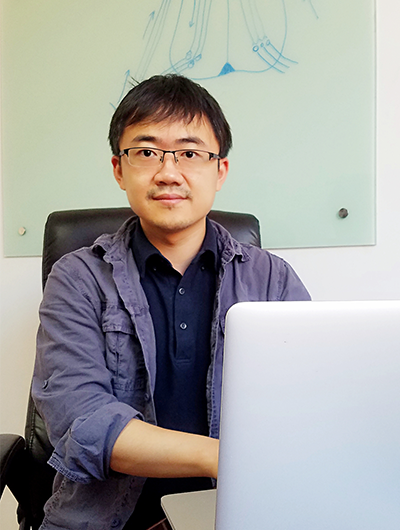
Adjunct Senior Principal Investigator
jing.yang@pku.edu.cn
2019 - Present Shenzhen Bay Laboratory Adjunct Senior Principal Investigator
2015 - Present Peking University Investigator
2011 - 2015 Rockefeller University Postdoc
2009 - 2011 Genentech Inc. Postdoc
2004 - 2009 UT Southwestern Medical Center PhD
Research Areas
Dr. Jing Yang has exploited the multidisciplinary approaches of whole-tissue 3D fluorescence imaging, mouse disease models, non-human primate and human samples, neurobiology, and immunology to pursue the frontier of neuroimmune research. In the recent works, Dr. Yang has revealed the involvement of neurodegeneration in modulating the immune and metabolic events and the new mechanisms underlying the neural control of immune organs or barrier tissues.
Highlights
From 2004 to 2009, Dr. Jing Yang completed the Ph.D. study at the University of Texas Southwestern Medical Center with the Nobel laureates Michael Brown and Joseph Goldstein. The research was focused on Ghrelin, one of the essential hormones for maintaining the body's metabolic homeostasis. Dr. Yang uncovered the mechanism responsible for the unique fatty-acid modification of Ghrelin and the novel strategy of targeting the Ghrelin's function for therapeutic applications (Yang et al., Cell 2008; Yang et al., PNAS 2008). This breakthrough solved the decade-long mystery of the field. In addition, the research findings resulted in three U.S. patents (US 7,544,466; US 8,013,015; US 8,329,745).
From 2009 to 2015, Dr. Yang received the postdoctoral training first at Genentech and then at the Rockefeller University under the supervision of Prof. Marc Tessier-Lavigne. The research investigated the process of axonal degeneration, one of the common pathological events in neurodegenerative diseases. Dr. Yang revealed the central role of the SARM1-mediated signaling pathway in axonal degeneration (Yang et al., Cell 2015; Yang et al., Neuron 2013; Osterloh et al., Science 2012). This landmark discovery identified a new type of programmed cell death, which has become the foundation for many recent studies in the field.
Since 2015, Dr. Yang has established an independent group at Peking University. With the expertise in physiology and neurobiology, the research has aimed at the frontier of neuroimmune regulation. Dr. Yang's recent findings demonstrated the involvement of neurodegeneration in modulating the immune and metabolic events and also elucidated the novel mechanism underlying the neural control of immune organs or barrier tissues (Jiang et al., Nature 2020; Liu et al., Science Advances 2020; Liu et al., Cell Metabolism 2021). These ongoing efforts have opened up a new dimension in the field and highlighted the roadmap for future research endeavors.
Honors
• 06/2016, Qiu-Shi Outstanding Scholar Award (by Hong Kong Qiu-Shi Science & Technologies Foundation), $150,000
• 06/2015, Tri-Institutional Breakout Prize (by The Rockefeller University, Weill Cornell Medical College, and Memorial Sloan Kettering Cancer Center), $25,000
• 05/2015, Regeneron Prize for Creative Innovation Finalist, $5,000
Selected Publications
(1) Liu K, Yang L, Wang G, Liu J, Zhao X, Wang Y, Li J, Yang J#. Metabolic stress drives sympathetic neuropathy within the liver. Cell Metabolism. 2021 Mar 2;33(3):666-675.
(2) Jiang Y, Liu T, Lee CH, Chang Q, Yang J#, Zhang Z#. The NAD(+)-mediated self-inhibition mechanism of pro-neurodegenerative SARM1. Nature. 2020 Dec;588(7839):658-663.
(3) Liu T, Yang L, Han X, Ding X, Li J, Yang J#. Local sympathetic innervations modulate the lung innate immune responses. Science Advances. 2020 May 13;6(20):eaay1497.
(4) Wang Q, Liu K, Yang L, Wang H, Yang J#. BoneClear: whole-tissue immunolabeling of the intact mouse bones for 3D imaging of neural anatomy and pathology. Cell Research. 2019 Oct;29(10):870-872.
(5) Ding X, Wang H, Qian X, Han X, Yang L, Cao Y, Wang Q, Yang J#. Panicle-Shaped Sympathetic Architecture in the Spleen Parenchyma Modulates Antibacterial Innate Immunity. Cell Reports. 2019 Jun 25;27(13):3799-3807.